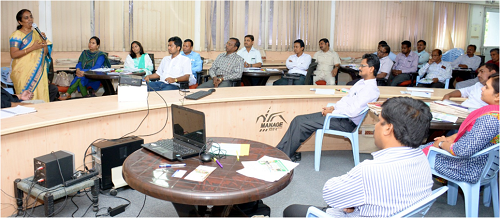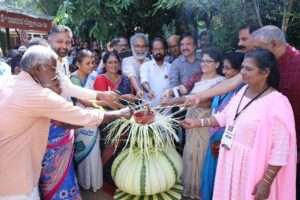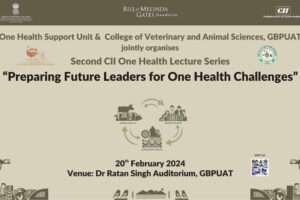MANAGE and CRISP jointly organized a training programme on Agricultural Innovation Systems from 27 June to 2 July 2016 at MANAGE. Sreeram Vishnu and Prabhugouda Kamaraddi participated in this training and they share their experiences here.
THE CONTEXT 
Agricultural Innovation System (AIS) is a framework widely used by the development practitioners around the globe to diagnose and reform agricultural sector. Extension and Advisory Services are integral into the AIS. A great value of AIS framework is that it allows the role and organization of extension to be understood as part of a wider canvas of actors, processes, institutions and policies that are critical for innovation. The National Institute of Agricultural Extension Management (MANAGE) and the Centre for Research on Innovation and Science Policy (CRISP) jointly organized a training programme on “Agricultural Innovation System (AIS)-Looking Beyond ATMA convergence” held at MANAGE, Hyderabad from 27 June to 2 July 2016. Thirty-five participants across the country from different fields and disciplines participated in the six day programme.

THE PROGRAMME
DAY 1:
Session I: Introduction
The programme started with a warm welcome by Dr R. Saravanan, Director (Agricultural Extension), MANAGE. Mrs. Usha Rani, IAS, Director General, MANAGE addressed the gathering on the first dayand she called upon the participants to be innovative and creative in their own context so that extension remain relevant in the present rapidly changing context. She gave several examples whereIndividuals, without waiting for big policy changes, have innovated and made a difference in their working environment. Dr Rasheed Sulaiman V, Director, CRISP briefed the participants on the objectives of the training and the training methodology.
Session II: Benchmarking
This session was intended to have a shared understanding on the agricultural challenges faced in the region where the participants are working and to benchmark their understanding of terms such as research, knowledge, technology, innovation, extension etc. The participants shared their understanding of the term “innovation” and this was discussed in the session. The session ended with a presentation by Rasheed on how the term “innovation” has evolved over the years and currently how innovation is defined, as “the process of generation, accessing and putting knowledge into use”.
Session III: Introduction to AIS
The session started with a presentation by Dr Rasheed on the Agricultural Innovation System (AIS). He narrated with examples about why interactions and knowledge flows among different actors (holding complementary knowledge) within AIS are critical for innovation. Participants were then divided into four groups. Two cases for detailed analysis were given to the groups. The groups were to make a proposal to solve the challenges mentioned in the case keeping in view the AIS framework. Based on their joint analysis, the groups made presentations. The presentations emphasized the need for fostering multi-actor collaboration to address the challenges.
Day 2:
Session IV: Diagnosis of AIS
Dr Rasheed gave a presentation on the diagnostic tools to assess and analyse innovation system. Citing the experience of using the four-element tool to diagnose the small holder dairying in Bihar, he explained how the tool was used and what results came out of this investigation. The study highlighted the importance of addressing the institutional and policy bottlenecks that constrain actor interaction in small holder dairying in Bihar and how these could be addressed.
Dr Saravanan, presented the case of e–Arik from Arunachal Pradesh which he piloted. The project tried to bring multi stakeholders on a single platform to provide knowledge support to rural communities. He shared the experience of bringing different partners and some of the lessons learnt from the project.
Session V: Analysing Partnership Experience
Participants’ presentation
Mr. Shyam Suraj (KVASU) who worked earlier with State Dairy Development Department, Kerala shared his experience of working with ATMA and some of the challenges in ATMA such as delayed arrival of funds, ineffective convergence, and mis-utilization of exposure visits meant for farmers. Dr. Senthil Murugan (KVASU) shared his experience on creating a resource pool of veterinary doctors in the field of entrepreneurship by selecting and training them on commercial livestock rearing. Dr. Vimal Antony (KVASU) briefed the participants on the initiatives of State Department of Animal Husbandry, in convergence with ATMA and KVASU. Dr. Saju George, (KVK, Kudagu, Karnataka) and Dr. Prabuddha Ray and Dr. Subrata Mondal (Rathindra KVK, West Bengal) presented in detail the wide range of partnerships their KVKs have with a number of organizations in the public, private and NGO sector.
Ms. Archana Dongre, (ATMA, Balghat, Madhya Pradesh) shared her experiences with achieving convergence with the line departments and the funding challenges. Dr. G.B. Kalariya, (Navasari Agricultural University) threw light on how the University is providing the technical knowledge support to ATMA and KVK functionaries and about the quarterly progress meetings which brings relevant actors for future course of action on board.
Mr. A R Periyakaruppan (Department of Agriculture, Trichy, Tamil Nadu) shared the experience of promoting machine transplanting in paddy in Trichy District and how different agencies (Department of Agriculture, Department of Agricultural Engineering, ATMA, NGOs and the media) are collaborating in this effort. Dr. Niranajan Panda (Orissa University of Agricultural Technology) highlighted the need for technological innovations and the roles research institutions should play in up scaling and out scaling new knowledge.
Mr B N Seshadri, (ICAR- Indian Institute of Soil and Water Conservation Bellary, Karnataka) talked primarily on the various activities and achievements of the institute. Dr. Kadiri Mohan (ANGRAU) shared the experience of ANGRAU in setting up the District Agriculture Technology Transfer Centres (DATTC) and the flag method to sensitize farmers on taking immediate action on field problems and use of WhatsApp groups to advise farmers.
DAY 3:
Session VI: Applying Diagnosis: Field visit
The field visits were planned to help the participants to apply the diagnostic tools they learnt in the previous day through interactions with different actors and to undertake a joint analysis. The participants visited Enabhavi village (Waragnal District, Telengana) where the Centre for Sustainable Agriculture (CSA), a leading NGO promoting non-pesticidal approaches and organic farming is working with the farmers. The participants were divided into four groups and each group explored the different dimensions that determine the capacity for innovation. The trainees had interacted with the representatives and field coordinators of CSA as well as with the office bearers of Farmers
cooperative. During the field visit, the trainees also got the opportunity to see the innovative field practices followed by the farmers like tank slit treatment of rice field to improve its fertility, preparation of Panchagavya (bio-formulation used for stimulating the plant growth) and cono weeding operation in SRI field.
DAY 4:
The four groups made presentations based on their assessment on the AIS components behind the
CSA initiative in the plenary. Dr Ramanjaneyulu, Executive Director, CSA, was also present during these presentations. Following this, Ramanjaneyulu shared his rich experience of working with the farmers and how CSA is supporting farmers to address their major constraints especially pest management through providing non-pesticidal alternatives and low prices for their produce by linking farmers directly to consumers through a producer company (Sahaja Aaharam).
This was followed by a presentation on the importance of leadership for innovation by Dr. K
Vijayaraghavan, Former Joint Director (Extension) Indian Agricultural Research Institute (IARI), New Delhi. Based on his analysis of three types of leadership styles, he has closely observed at IARI, he explained the importance of leadership for agricultural innovation and how leaders promoted different types of partnerships for technology promotion.
Doctoral scholar from NDRI, Mr. Sreeram Vishnu made a presentation on the diagnosis of AIS in the dairy value chain of Kerala (Nature Fresh Model) using the Social Network Analysis (SNA). The actors and information flows were mapped using the SNA and implications were drawn for its improvement.
GFRAS and AESA: Dr. Rasheed made a presentation on the Global Forum For Rural Advisory Services (GFRAS) and the Agricultural Extension in South Asia (AESA) highlighting the roles these networks are playing to strengthen extension and advisory services (EAS) globally and regionally. GFRAS and AESA has published several documents on AIS and how EAS should play new roles on strengthening AIS.
Day 5:
Session VII: ICTs and Gender in AIS
Dr. Shaik N Meera, from the Indian Institute of Rice Research (IIRR) highlighted the role of ICTs in promoting knowledge flows and interactions among the varied actors in AIS. He specifically focused on achievements and challenges of the Rice Knowledge Management Portal (RKMP) and also discussed the emerging ICT tools that can strengthen the AIS.
Dr. K Uma Rani, Director, MANAGE spoke on the need for gender mainstreaming in agriculture and working in convergence with different partners to foster gender inclusive innovation. To internalize the concepts she presented, the trainees were given cases to analyse how gender issues would be addressed.
Session VIII: Visit to Innovation Centers
Participants were divided into two groups for this visit. One group visited the Indian Institute of Millet Research (IIMR) and the other visited a-IDEA, the agribusiness incubator at the National Academy of Agricultural Research Management (NAARM). The visit helped the participants to understand how IIMR and a-IDEA work with different types of partners to promote innovation. Dr. Dayakar Rao, Principal Scientist (IIMR) and Dr K. Srinivas, Principal Scientists (NAARM) briefed the participants about these initiatives.
Day 6:
Session IX: Operationalising AIS in your organization/Project setting
Based on their experience and interaction with the resources persons at these two innovation centres, each group made a presentation on the nature of partnerships and how these partnerships are contributing to innovation and impact.
Dr. Saravanan made a presentation on the potential of social media in agriculture and how social media is promoting knowledge flows among the different actors in the AIS. He quoted several examples of Facebook groups and also shared the results from the online survey conducted by GFRAS on the use of social media by different agricultural stakeholders.
In another presentation, Dr. Saravanan talked about the promotion of SRI (Systems of Rice Intensification (SRI) in Tripura. The study on AIS around SRI focused on the actor diversity in supporting the SRI in the State, information flows and role of each actor, especially the catalytic role played by Panchayath Raj Institutions and State Department of Agriculture in the AIS in Tripura.
“If new knowledge should result in innovation and impact, we should move from Research/ Extension Management to Innovation Management.” This was the main argument put forth by Dr. Rasheed in his presentation on Innovation Management. His presentation also covered a wide range of functions and tools employed by different projects to promote innovation.
Session X: Closing Session
In the closing session, Dr Rasheed gave a recap of the whole training programme and how different sessions and learning events were designed to promote learning. He also refereed back to the participants’ expectations collected on Day 1 and how the facilitators tried to meet these. Detailed feedback on the whole training programme was also collected in a feedback form.
Mrs Usha Rani, IAS, Director General, MANAGE and Dr K N Kumar IAS, Chief Executive, National Fisheries Development Board (NFDB) were present as Chief Guests in the closing session. A few participants also shared their experience with the training. The participants talked about the most important aspects they learnt in the training and how they intend to put this new learning back in their work environment. The Valedictory session ended with distribution of certificates to the training participants.
Our Observations
The training on AIS was innovative in nature on several counts. To start with the training programme itself was designed and conducted jointly by MANAGE, the
apex institution for Agricultural Extension Management in the country with Centre for Research on Innovation and Science Policy (CRISP), a leader in extension and innovation policy research. Other innovative features of the programme were the following:
- In the introductory session, the participants were introduced by organizing them as pairs with colleagues whom they have never met before and each introducing the other to the participants.
- The expectations of participants were also collected on day 1 through a card exercise and these were used as a guide in planning other sessions in the coming days.
- A mix of training activities was blended together, to give an enriching experience to the It comprised presentations, case studies, card exercises, group exercises, plenary presentations, field trips and visit to innovation centres at NAARM and IIMR. These exercises helped the participants to get better conceptual clarity on AIS and how to use the AIS framework in their work environment.
- The expert lectures covered different dimensions of AIS, the role of Agricultural Extension inAIS and the different tools that could be used for applying AIS framework. Role of ICTs, Leadership, Partnerships, Inclusiveness (e.g.: gender) in strengthening AIS was also presented through lectures
- Young research scholars were given the opportunity to participate in the programme as the social media reporters cum facilitators.
- There were specific sessions to share participants experience related to partnerships and innovative practices and these helped in discussing some of the practical challenges and different ways by which these are addressed.
- Importantly the training programme started and concluded without any formal ceremonies, thus saved a great amount of time, which was constructively spent on the various training activities.
- Hospitality of the MANAGE was excellent and all the trainees were highly satisfied with the kind of facilities provided including accommodation and food.
- Feedback from the participants was collected at the end of the programme regarding various aspects like relevance, coverage and style of the training. This enables the organizers to review the training holistically and make needed changes to improve the content and methodology in similar trainings elsewhere.
Final Remarks
The week long training generated a great amount of enthusiasm among the participants prompting them to apply the learning and driving the need for looking beyond ATMA convergence. The importance of partnerships and collaborations with other actors in the AIS was highlighted with a renewed seriousness about achieving innovation and impact. All these learnings were made possible only because the participants were taken through a broad range of leaning events. Further, the trainees understood the broader role of extension and different set of functions it should perform beyond dissemination of information. Going by the words of Dr. Niranjan Panda, Associate Professor, OUAT, “Till I attend this training, I believed that extension is a post research task. But after now I am quite sure that its role is very much broader and should go in parallel with the research”.
Sreeram Vishnu is a Research Scholar at National Dairy Research Institute (Email: srieeram@gmail.com ) and Prabhugouda Kamaraddi is a Senior Research Fellow, National Institute of Agricultural Extension Management (MANAGE) ( Email: prabhuvnl@gmail.com )





Add Comment